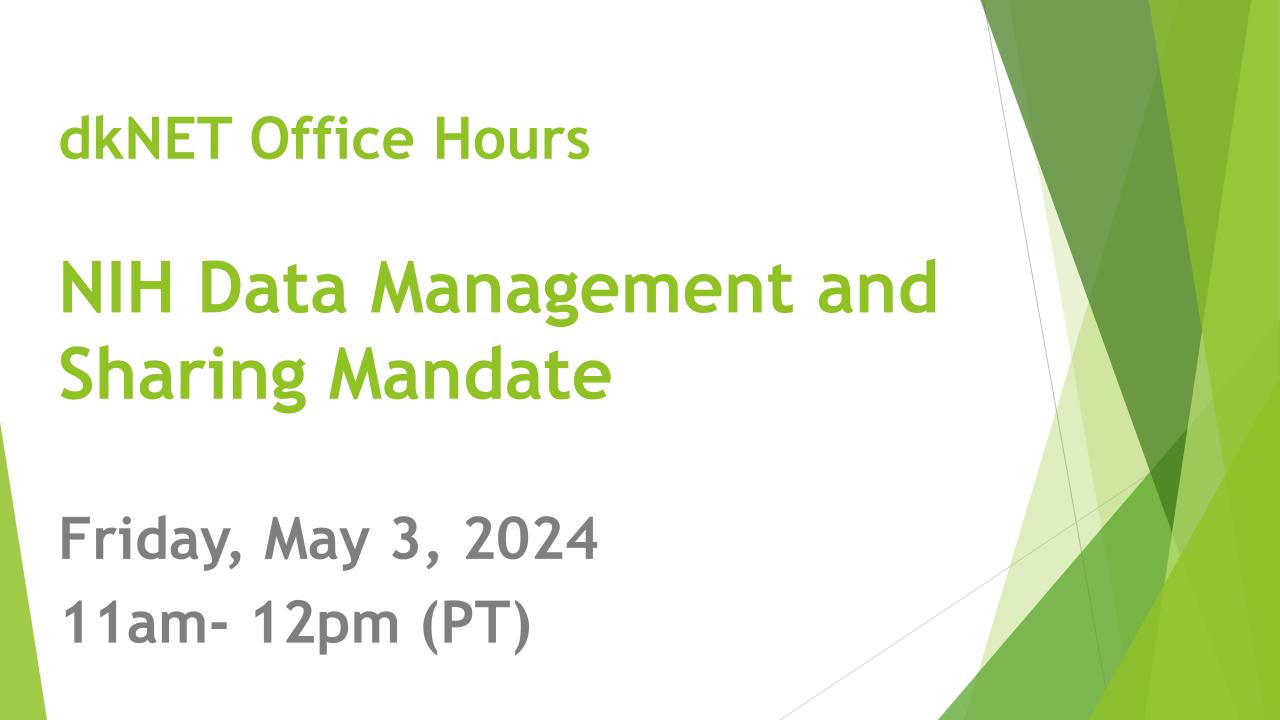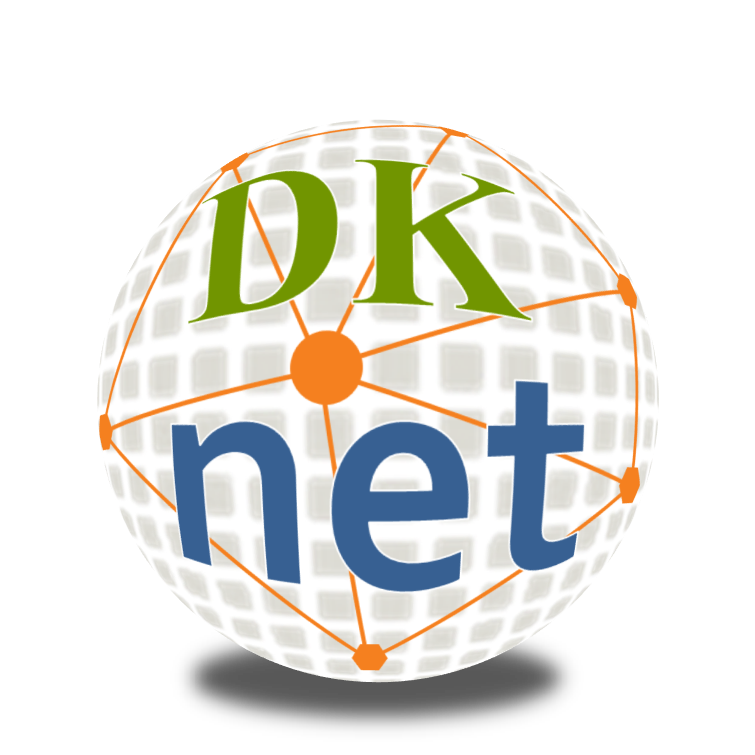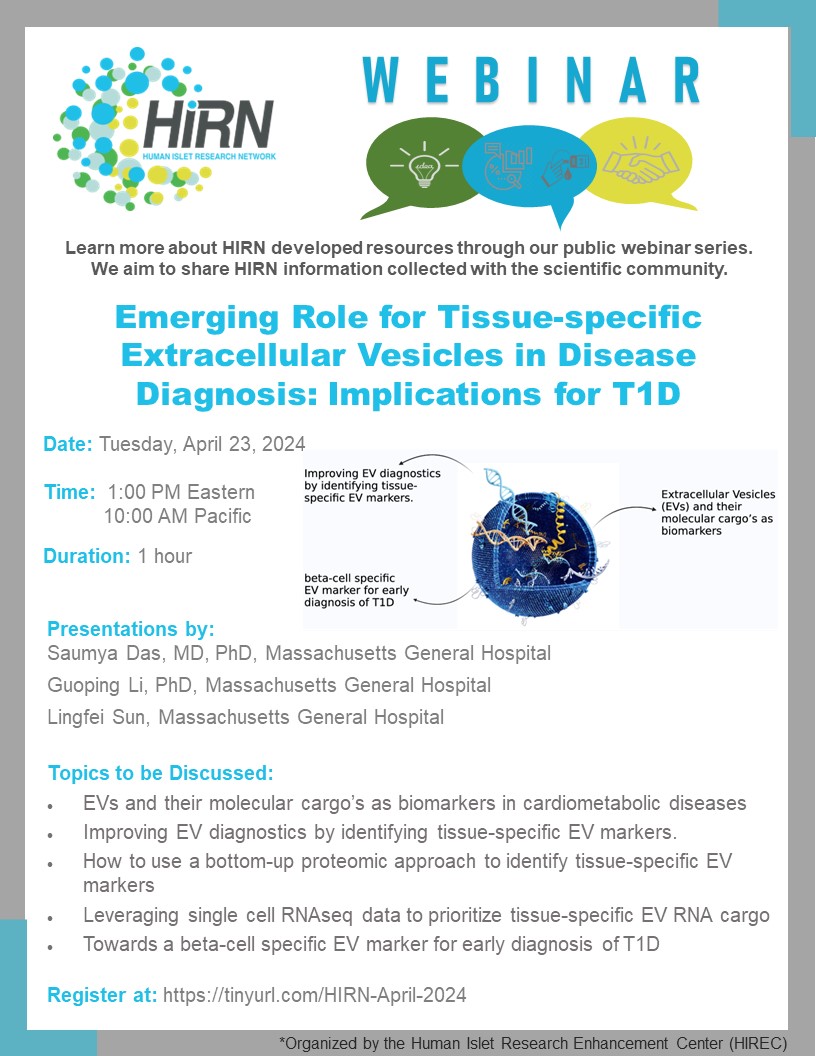Leaving Community
Are you sure you want to leave this community? Leaving the community will revoke any permissions you have been granted in this community.
dkNET community events and announcements in January, 2017
Dear dkNET Community,
dkNET provides updates on activities of interest to the NIDDK-supported community. You could keep up to date on these activities through our Twitter feed @dkNET_info, through our Community Calendar, or through dkNET e-mail list. If you have an event or funding opportunities you'd like to advertise, please contact us info_at_dknet.org.
dkNET Updates:
We have added the new cross reference feature to the following data views:1. ClinicalTrials.gov and NIDDK Central Repository
2. NURSA dataset and GEO: MicroarrayExperiment
- At ClinicaltTrials.gov data view, we provide the user additional information about whether the specimen or dataset was deposited in the NIDDK Central Repository.
- At NIDDK Central Repository data view, the user can find study register information if the study was registered at ClinicalTrials.gov.
- At NURSA Dataset data view, the user can find the original dataset information.
- When the user finds the data of interest at GEO: MicroarrayExperiment data view, the user can also find annotated dataset information if the dataset was curated by NURSA.
Events in January, 2017
Jan. 3, 2017
Abstract submission deadline: 77th Annual American Diabetes Association (ADA) Scientific Session
The Scientific Sessions offers researchers and health care professionals the unique opportunity to share ideas and learn about the significant advances in diabetes research, treatment, and care. Over the course of five days, participants will receive exclusive access to more than 3,000 original research presentations, take part in provocative and engaging exchanges with leading diabetes experts and expand professional networks with over 13,000 professional attendees from around the world. The program will start on Friday, June 9 at 11:30 a.m. with our Mini-Symposia Sessions, and conclude on Tuesday, June 13 at 11:45 a.m. following the ADA Presidents Oral Session.Chaitan Baru, National Science Foundation
Location: San Diego, CA
More information: http://professional.diabetes.org/meeting/scientific-sessions/77th-scientific-sessions
Jan. 6, 2017
The BD2K Guide to the Fundamentals of Data Science Series: Computing Overview
Speaker: Patricia Kovatch, Icahn School of Medicine at Mount Sinai
More information: http://www.bigdatau.org/data-science-seminars
Jan. 12, 2017
JAX Webinar: The Basics of Mouse Nomenclature
What’s in a name? From mouse strain nomenclature you can determine genetic background, genetic modifications, who created the strain and who currently distributes it. As well, formal nomenclature reflects the genetic changes that occur in mouse strains. During this webinar, you will learn how to interpret mouse strain nomenclature and why maintaining genetic stability in mouse colonies is critical to generating the most reliable and reproducible data.
More information: https://www.jax.org/education-and-learning/education-calendar/webinars/2017/012017/nomenclature-jan12
Jan. 13, 2017
The BD2K Guide to the Fundamentals of Data Science Series: Workflow & Pipelines
Speaker: Rommie Amaro, University of California, San Diego
More information: http://www.bigdatau.org/data-science-seminars
Jan. 17, 2017
ENDO2017 Early Registration Deadline
ENDO 2017 is the world’s premier event for presenting and obtaining the latest in endocrine science and medicine. With an extensive program covering a broad array of topics, various networking opportunities, poster sessions, continuing medical information, updates on new products and technologies at the ENDOExpo, keynote speakers, and more, attendance at ENDO is a “must-attend” event. Come join 7,500 of your colleagues for an educational experience that will enhance your professional development, improve your work, build your reputation, and shape the future of the field.
Location: Orlando, FL, USA
More information: https://www.endocrine.org/endo-2017
Jan. 19-23, 2017
The Immunology of Diabetes Society (IDS) Meeting 2017
The purpose of IDS is to foster research related to the genetics and pathogenesis, prevention and cure of type 1 diabetes and to act as an international forum for scientific discussion of all aspects of the immunology of insulin-depende
Location: San Francisco, CA, USA
More information: http://www.ids2017.org
Jan. 19, 2017
JAX Webinar: Generating mouse Models Using CRISPR/Cas
Do you need to generate new mouse models within 3-4 months instead of 1-1.5 years? Revolutionary CRISPR/Cas technology enables rapid, economical model generation through precise genome editing. During this webinar, we will help you understand the potential of CRISPR/Cas to accelerate your research.
More information: https://www.jax.org/education-and-learning/education-calendar/Webinars/2017/012017/crispr-jan-19
Jan. 20, 2017
The BD2K Guide to the Fundamentals of Data Science Series: Computer Science & Software Engineering (API)
Speaker: Trey Ideker, University of California, San Diego
More information: http://www.bigdatau.org/data-science-seminars
Jan. 22- 26, 2017
Keystone Diabetes Meeting
Diabetes (J3) joint with the meeting on Obesity and Adipose Tissue Biology (J4).
Location: Keystone, CO, USA
More information: http://www.keystonesymposia.org/index.cfm?e=Web.Meeting.Program&meetingid=1453&subTab=program
Jan. 22-25, 2017
50th Miami 2017 Winter Symposium Diabetes: Today's Research - Tomorrow's Therapies
The 50th Miami Winter Symposium on “Diabetes: Todays’ Research- Tomorrows’ Therapies” will be a comprehensive presentation of the most recent research on both types of diabetes, based on which prevention and advanced cures are close to implementation. Who should attend: all those interested in understanding the molecular bases of one of the most prevalent disease of humans; those curious to perceive how research can be translated into therapies; those, associated with pharmaceutical companies ready to transfer science into applications and those who want to teach beyond textbook information. For all these attendees, a feast has been prepared with an incredible line-up of the world leaders in the field of diabetes.
Location: Miami, FL USA
More information: http://www.miamiwintersymposium.com
Jan. 26, 2017
JAX webinar: Achieving Reproducible Mouse Studies
Success in the drug development pipeline depends on success in basic and preclinical research. Join us to learn about unique experimental design considerations for mouse-based research. We will discuss topics critically important to the reproducibility of your mouse studies.
More information: https://www.jax.org/education-and-learning/education-calendar/webinars/2017/012017/reproducible-studies-jan-26
Jan. 27, 2017
Registration deadline: 2017 JDRF nPOD 9th Annual Scientific Meeting
The Network for Pancreatic Organ Donors with Diabetes (nPOD) is proud to host its 9th Annual Meeting at the Fort Lauderdale Marriott Harbor Beach Resort & Spa in Fort Lauderdale, Florida, February 19-22, 2017. Over the past nine years, JDRF nPOD has made remarkable strides in terms of meeting its organizational goals. Key amongst them seeing its investigators making discoveries that answer the question of, “What causes type 1 diabetes?” nPOD is making remarkable strides toward that goal and hence, we anticipate the 2017 meeting will continue to foster meaningful collaborations toward that goal through directed topic discussions.
Location: Fort Lauderdale, FL USA
More information: http://www.jdrfnpod.org/news-events/2017-jdrf-npod-8th-annual-scientific-meeting-registration/
Jan. 27, 2017
The BD2K Guide to the Fundamentals of Data Science Series: Modern Computing: Cloud, Distributed, & High Performance
Speaker: Umit Catalyurek, The Ohio State University, Columbus
More information: http://www.bigdatau.org/data-science-seminars
Funding opportunities information and deadlines in January, 2017
Jan. 5, 2017
Funding Application Due Date: NIDDK Exploratory Clinical Trials for Small Business (R44)
The purpose of this Funding Opportunity Announcement (FOA) is to provide a vehicle for Small Business Concerns (SBCs) submitting Small Business Innovation Research (SBIR) grant applications for investigator-in
More information: http://grants.nih.gov/grants/guide/pa-files/PAR-17-034.html
Jan. 10, 2017
JDRF Funding opportunity application deadline: Neoepitopes in Type 1 Diabetes: Staging, Pathogenesis, and Therapeutic Utility
A number of beta cell neoepitopes, modified forms of native antigen, have been described and implicated in Type 1 Diabetes (T1D) pathogenesis. However, to date the utility of T1D neoepitopes either as biomarkers for improved disease staging/prognos
More information: http://grantcenter.jdrf.org/rfa/neoepitopes-in-type-1-diabetes-staging-pathogenesis-and-therapeutic-utility/
Jan. 12, 2017
Funding Application Due Date: Coordinating Unit for the Diabetic Complications Consortium (U24)
The purpose of this FOA is to support the NIDDK Diabetic Complications Consortium Coordinating Unit (DiaComp-CU). The DiaComp-CU will continue to enhance and maintain the DiaComp website, and will provide administrative oversight for consortium meetings and opportunity pool programs.
More information: http://grants.nih.gov/grants/guide/rfa-files/RFA-DK-16-036.html
Jan. 12, 2017
Funding Application Due Date: Coordinating Unit for the Mouse Metabolic Phenotyping Centers (U24)
The purpose of this FOA is to support the Coordinating Unit for the NIDDK Mouse Metabolic Phenotyping Centers Consortium (MMPC-CU). The MMPC-CU will continue to enhance and maintain the MMPC website and database, and will provide administrative support needed to enhance MMPC services, meetings, and opportunity pool programs.
More information: http://grants.nih.gov/grants/guide/rfa-files/RFA-DK-16-034.html
Jan. 12, 2017
JDRF Funding opportunity letter of intent due date: Novel Bioengineered Materials and Device Concepts to Facilitate Development of Encapsulation Systems for Type 1 Diabetes
JDRF is committed to accelerating the development of a beta cell replacement therapy with a replenishable source of insulin-produci
More information: http://grantcenter.jdrf.org/wp-content/uploads/2016/12/Novel-encapsulation-systems_FY17_RFA.pdf
Jan. 24, 2017
JDRF Funding opportunity application due date: Studies to Preserve or Restore Hypoglycemia Awareness and/or the Counter-Regulatory Response in T1D
JDRF aims to accelerate the discovery and translation of therapies to prevent or treat hypoglycemia unawareness in people with T1D as this complication significantly increases the risk of severe hypoglycemia that can lead to seizure, coma, cardiac arrhythmias and increased mortality. To this end, JDRF is soliciting letters of intent for research with the potential to translate into novel therapeutic strategies that will significantly reduce the incidence of hypoglycemia by maintaining or restoring awareness of potentially life-saving hypoglycemia warning symptoms in individuals with T1D.
More information: http://grantcenter.jdrf.org/rfa/studies-to-preserve-or-restore-hypoglycemia-awareness-andor-the-counter-regulatory-response-in-t1d/
Jan. 24, 2017
Letter of Intent Due Date: APOL1 Long-term Kidney Transplantation Outcomes Network (APOLLO) Clinical Centers (Collaborative U01)
The purpose of this FOA is to support the Coordinating Unit for the NIDDK Mouse Metabolic Phenotyping Centers Consortium (MMPC-CU). The MMPC-CU will continue to enhance and maintain the MMPC website and database, and will provide administrative support needed to enhance MMPC services, meetings, and opportunity pool programs.
More information: http://grants.nih.gov/grants/guide/rfa-files/RFA-DK-16-034.html
Jan. 24, 2017
Letter of Intent Due Date: APOL1 Long-term Kidney Transplantation Outcomes Network Scientific and Data Research Center (APOLLO SDRC)(Collaborative U01)
This Funding Opportunity Announcement (FOA) invites cooperative agreement applications to establish a multi-disciplin
More information: http://grants.nih.gov/grants/guide/rfa-files/RFA-DK-16-024.html
Jan. 25, 2017
JDRF funding opportunity application deadline: Additional Signals for Next Generation AP Systems
In 2006, JDRF launched its Artificial Pancreas Project to accelerate the development of commercially available closed-loop systems. Since then, significant progress has been made in developing and testing algorithmic approaches to automate insulin delivery, and clinical studies have progressed to the outpatient pilot setting. The NIH are currently funding large efficacy studies in this area and at least one manufacturer has announced their intent to launch a first generation AP system in 2017. One of the issues with first generation AP systems is that the kinetics of insulin delivered subcutaneously does not match the speed of endogenous insulin activity. Therefore, users are still required to interact with these AP systems to announce food intake to facilitate optimal control. In the same way, exercise must be managed by the user, since it could lead to hypoglycemic events or even temporarily increase glucose levels, as is the case with certain types of exercise. Finally, stress also has significant impact on blood sugar levels, which must also be managed by the user. Hence, JDRF would like next generation AP systems to be more automated, so identifying additional signals which allow automatic compensation of these issues by the AP system, such as physiological biomarkers and/or habitual and geospatial approaches, is the purpose of this call.
More information:
http://grantcenter.jdrf.org/rfa/additional-signals-for-next-generation-ap-systems/
Jan. 26, 2017
Funding Application Due Date: Limited Competition: Research Resource for Human Organs and Tissues (U42)
The purpose of this FOA is for the support of a Research Resource for Human Organs and Tissues for the continued availability of human tissues and organs to biomedical researchers in the United States. The research resource is expected to facilitate procurement, preservation, and distribution of human tissues and organs to qualified biomedical researchers.
More information: http://grants.nih.gov/grants/guide/rfa-files/RFA-OD-17-001.html





